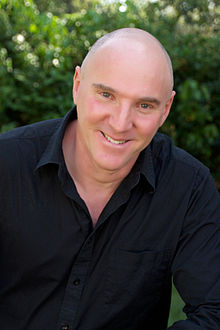Amir Alexander
Amir Alexander | |
|---|---|
 | |
| Born | |
| Children | 2 |
| Academic background | |
| Alma mater | Hebrew University of Jerusalem (B.S. 1988) Stanford (M.A. 1990; Ph.D. 1996) |
| Academic work | |
| Discipline | History of science |
| Institutions | UCLA |
Amir Alexander is a historian, author, and academic who studies the interconnections between mathematics and its cultural and historical setting.
Early life and education
[edit]Born in Rehovot, Israel, he grew up in Jerusalem[1] where his father, Shlomo Alexander, was a professor of physics at the UCLA and the Hebrew University and his mother, Esther Alexander, was an economist and social activist.[2][3][4]: xv He obtained a B.S. from the Hebrew University in Jerusalem in 1988 in mathematics and history, before moving to the United States, where he obtained an M.A. in history of science from Stanford University in 1990, and a Ph.D. in history of science from Stanford University in 1996.[5]
Career
[edit]His first book, Geometrical Landscapes: The Voyages of Discovery and the Transformation of Mathematical Practice, was published in 2002.[4][6] The book describes the 17th century English exploration of the Americas, the early exploration by English mathematicians of infinitesimals, and the relationship between the two, and argued that "If a strong relationship can be established between an historically specific nonmathematical tale and the narrative of a mathematical work that originated within its social sphere, then mathematics can indeed be said to be fundamentally shaped by its social and cultural setting."[6][7]
His second book, Duel at Dawn: Heroes, Martyrs, and the Rise of Modern Mathematics, was published in 2010.[8][9] The book begins describing the death of Evariste Galois in a duel in 1832 and makes the argument that the ideas and culture of the Romantic age influenced the way mathematicians saw themselves and the very mathematics that they created.[9]
His third book, Infinitesimal: How a Dangerous Mathematical Theory Shaped the Modern World was published in 2014.[10][11][12] The book returns to the topic of the history of the study of infinitesimals in the 17th century, and locates arguments about the validity of the mathematical concept in the struggles between Roman Catholics and Protestants in the Reformation and Counter-Reformation and the accompanying political struggles between authoritarian and more pluralistic approaches to governing.[11][12] Infinitesimal was selected as one of the best science books of 2014 by Library Journal[13] and by Slate magazine.[14] His fourth book, Proof!: How the World Became Geometrical, was published in 2019.[15] His fifth book, "Liberty's Grid" was published in 2024 by the University of Chicago Press.
He has contributed pieces to The New York Times's Science and Book Reviews sections,[16] The Los Angeles Times Op-Ed section,[17] and Scientific American,[18] and he has been interviewed on NPR's All Things Considered,[19] and Interfaith Voices.[20]
Personal life
[edit]Alexander lives in Los Angeles with his wife and two children.[1] He teaches history at UCLA.[5]
See also
[edit]References
[edit]- ^ a b Shook, Karen (June 19, 2014). "The Author". Times Higher Education.
- ^ Obituaries: Shlomo Alexander Archived 2015-06-26 at the Wayback Machine Physics Today, December, 1998: 73-74
- ^ Shimshon Bichler. November 2005 דיוקן לאסתר אלכסנדר ולתקופתה English translation by Google Translate: Portrait Esther Alexander and Times
- ^ a b Alexander, Amir (2002). Geometrical Landscapes: The Voyages of Discovery and the Transformation of Mathematical Practice. Stanford, California: Stanford University Press. pp. 312. ISBN 9780804732604.
- ^ a b Amir Alexander, Adjunct professor, Department of History UCLA
- ^ a b Reuben Hersh for The American Scientist. May–June 2003 Book Review: In Search of Interior Riches Archived 2016-03-04 at the Wayback Machine
- ^ Kim Williams Book review: Geometrical landscapes: The voyages of discovery and the transformation of mathematical practice The Mathematical Intelligencer Fall 2006, 28(4):58-60
- ^ Alexander, Amir (2010). Duel at Dawn: Heroes, Martyrs, and the Rise of Modern Mathematics. Cambridge, MA: Harvard University Press. pp. 320. ISBN 9780674046610.
- ^ a b Tony Mann for Times Higher Education. May 6, 2010 Book of the Week: Duel at Dawn: Heroes, Martyrs, and the Rise of Modern Mathematics
- ^ Alexander, Amir (2014). Infinitesimal: How a Dangerous Mathematical Theory Shaped the Modern World. New York, NY: Scientific American / Farrar, Straus and Giroux. p. 368. ISBN 9780374176815. Archived from the original on September 15, 2016. Retrieved June 18, 2015.
- ^ a b Paulos, John Allen (April 7, 2014). "The 16th Century's Line of Fire: 'Infinitesimal,' a Look at a 16th Century Math Battle". The New York Times.
- ^ a b Arianrhod, Robin (June 19, 2014). "Infinitesimal: How a Dangerous Mathematical Theory Shaped the Modern World, by Amir Alexander". Times Higher Education.
- ^ "Library Journal's Best Books of 2014", Library Journal, October 22, 2014, archived from the original on June 26, 2015, retrieved June 18, 2015
- ^ "Best books of 2014: Slate staff picks", Slate, November 2014
- ^ Alexander, Amir (2019). Proof!: How the World Became Geometrical. New York, NY: Scientific American / Farrar, Straus and Giroux. p. 320. ISBN 9780374254902.
- ^ New York Times NYT articles by Amir Alexander
- ^ Alexander, Amir (May 3, 2014). "Think the climate change fight is tough? What about the 17th century fight over math?". The Los Angeles Times.
- ^ Alexander, Amir (March 18, 2014). "A Brief History of Infinitesimals: The Idea That Gave Birth to Modern Calculus". Scientific American.
- ^ "Far From 'Infinitesimal': A Mathematical Paradox's Role In History", All Things Considered, NPR, April 20, 2014
- ^ Interfaith Voices
External links
[edit]- Faculty website (UCLA)
- Historians of mathematics
- University of California, Los Angeles faculty
- Hebrew University of Jerusalem alumni
- Stanford University alumni
- Living people
- Scientists from Jerusalem
- 1963 births
- People from Rehovot
- 21st-century Israeli historians
- 20th-century Israeli male writers
- 21st-century Israeli male writers
- Israeli expatriates in the United States
